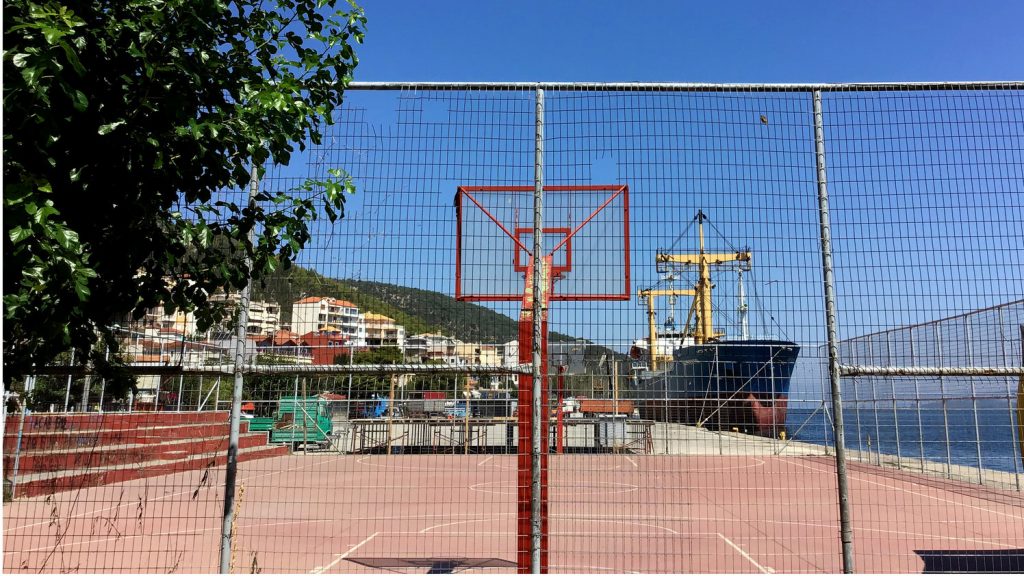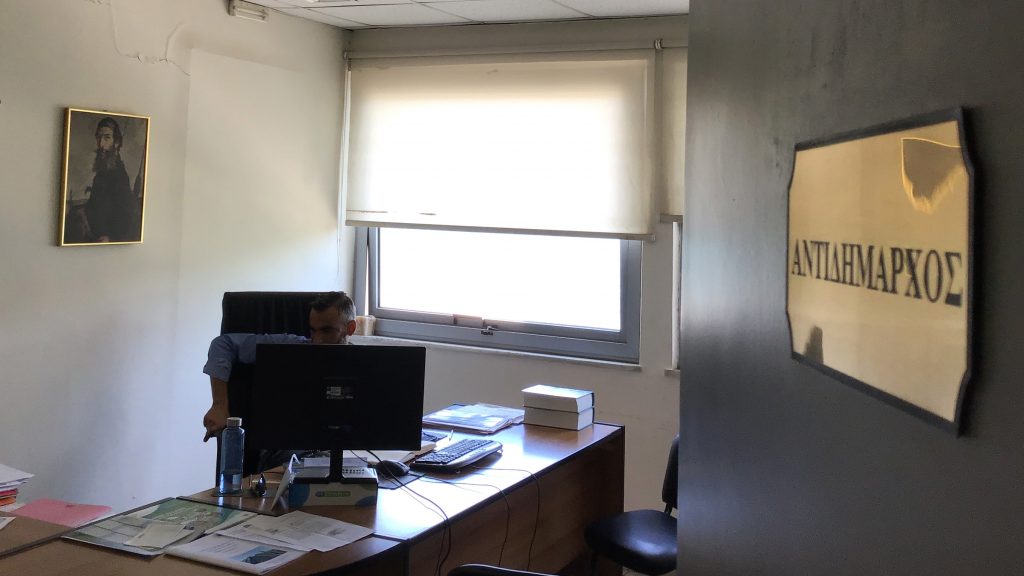Whereas percentages of participation in the recent general elections and Euro elections in Greece reached historically low percentages, people still turn out to vote for the local administration elections. How does the local government keep on bringing the electorate to the ballot boxes?
It is a rainy evening and a company of friends is enjoying their drinks at the new bar in town but when the phone of the 35 years old guy rings he grabs it and runs out of the place. It is an emergency. The flooding at the mountainous area of the municipality is threatening a farmer’s cottage and sheep.
He’s coming back to the table, he apologizes and he is wearing his coat, looking for his car keys. He has to drive for about 45 minutes to the remote area, expecting for the services he has already called, due to an emergency situation to arrive in time.
“In local administration, there are problems that need to be solved right now on a 44/7 basis and you can never turn off your phone,” says Nikos.
Nikos Choutas is the former deputy mayor and accountable for the finances. The recent elections on May 26 have defined the new mayor and the councilors to tackle the issues of the local area. The city hall is located at Amfilochia’s city centre, a picturesque seaside town of Western Greece, with the doors remaining open for the public to meet the mayor and the councilors in person and discuss. “In the level of higher administration that can’t happen. The relationship with the state is impersonal, that’s why during the crisis, people started to feel closer to the local governments,” says Nikos.

The direct and intimate character of the local government appears to maintain the interest of people in politics, even if that is eliminated to the local affairs and the things that can improve the everyday way of living in practice. Maybe this is the reason why the local administration’s elections appeal to the citizens much more than the parliamentary elections anymore. “In local administration, you have the opportunity to create, to take initiatives… maybe small, but with high importance within a society,” adds Nikos.
Despite the fact that the relationship between the local governments and the citizens is still quite strong, participation in the ballot boxes for the local administration doesn’t seem to be a motivation for active engagement to the commons. Giorgos Katsoulas is the new mayor of Amfilochia and as he explains there is no willingness of people who could actually make a change at the local level, to participate in the local elections, mostly because they’re disappointed by the central political scene.
The local councils in the municipalities are being held once a month and they’re open for the burghers to attend, yet in most of them, the hall is almost empty, with only the local councilors taking part in them. Georgios Liapis is a member of the local council since 2010 and as he describes the councils were being held around 2 pm, when most of the people were going back home after work, to have lunch and get some rest. “We need to encourage people’s participation and show respect to them and their schedule so that we can listen to their needs, ” says Mr. Liapis.
The relationship with the state is impersonal, that’s why during the crisis, people started to feel closer to the local governments”.
NIKOS CHOUTAS, Former deputy mayor
The timetable of the local councils is not the only reason that appears to repel citizens’ participation. The councils don’t appear to draw citizen’s attention and active participation via dialogue and discussion is still missing even in the first level of direct democracy. As Nikos explains, complicated and technical issues are on the board’s table for discussion at the councils but citizens who don’t have the specialised knowledge can’t even understand them. As he says, “local councils are a bit stale and boroughs only show up when they know that something which has a direct impact on them or it really affects their professions is going to be discussed. ”

While with no active participation, the local councils seem to happen only for the voting procedures to be executed, the plan of the new mayor of Amfilochia’s municipality is for the councils to be held outside the town hall and close to local communities. As Giorgos Katsoulas says, once a week he’ll not be at his office, but outside, talking to people, along with the councilors, in open discussions. If that happens, fertile ground for active citizens’ participation is about to be created, allowing a more intimate connection and involvement of the public to the local governments’ decisions.
In the recent regional pre-elections period the conversations raised about the participation of young people in the ballot papers, but the question is, why do we pay attention to young people’s participation in the local level administration? Unfortunately, not only in Amfilochia but in many other small cities, the population of older people who live and work in them is significantly higher than this of young people. Most of the young people leave small cities in order to study and work in Athens or in other big cities and they only visit their hometown for holidays. As a result, little concern they have about participation in the local things. “When you are young and you participate in politics as a candidate, you go directly into deep waters,” says Nikos who was always politically active and he entered politics at a young age. The world of politics is a ground that especially young people are aware of but in practice, they are afraid to get involved in.
After 2011 and the administrations’ reform, local governments are responsible for more complex duties than before. “Sometimes you have to sacrifice your personal time because people can easily find the phone number of a member of the board to call for an issue they have, whether being minor or quite important, ” says Nikos. Except for emergency conditions, a phone call is the most popular, and sometimes inappropriate, way of trying to solve problems. From a burnt lamp and a chuckhole on the street to the litters picking up from the city center, Nikos receives many calls on a daily basis for issues he’s not even responsible for.
“ The municipality government’s role is to have vision and willingness for reaching out and solve everyday life problems. If you achieve that, little meaning has which party you belong in”.
George Liapis, councilor at Municipality of Amfilochia
Proximity and intimacy are the two main adjectives to describe the relationship between the citizens of a municipality and the local authorities but this intimacy is quite often a synonym of interdependence. In the first level of governance, interpersonal relations and clientism were always the biggest enemies of voting procedures. As Mr. Liapis explains, both politicians and citizens cultivate this culture since on the one hand, people have the feeling they own to the person in the council who picked up the phone and solved his problem, and on the other hand politicians use these small ‘favours’ as a way to get votes in the next elections.
This acquaintanceship mentality in the Greek political culture is deep-rooted and a result of the two-party system that was governing the country from the regime change era until 2015. Even in the local administration pre-elections polarized environment, and the rallies’ glory belongs to the past. However, political parties still exist at the local level. “Especially older people, and by older, I mean in way of thinking, they’d vote for a candidate supported by the party they support at the national elections,” George Liapis says. With old-fashioned and traditional mentalities playing a big role in decision-making processes in local administration, the question that arises is whether the political parties’ predominance controls local politics.
George is experiencing politics on the local level as a citizen and professional and also as a member of the city’s council for almost a decade. As he explains, this phenomenon is eliminating since younger generations have a totally different mentality than the old one and also because local governments don’t implement the political and ideological plans of each government. “The municipality government’s role is to have vision and willingness for reaching out and solve everyday life problems. If you achieve that, little meaning has which party you belong in,” says George Liapis.
The sentiment of willingness for doing things is not only proved in the politicians’ decisions and signatures. Nikos remembers cases during the years of his service when people’s initiatives forced to change to be made. Once, he received a long explanatory email from a local citizen, with knowledge in archaeology who was explaining in detail how the municipality could upgrade the archaeological and historical sites of the area to attract people and tourists. He did study the plan and he passed it to the services in order to accomplish it. Citizen’s interference can have way positive results on a local level, not only with new ideas but also because as Nikos says, the busy schedule of the council doesn’t allow him to have an eye on everything and this is when citizens should ring the bell to him.

Niko’s duties throughout this four-year period as a deputy mayor included attendance in events organized by the schools where he had the chance to discuss with the young people about their concerns. In our conversation, Nikos highlights that fresh minds are essential for the local communities to move forward and progress. “The previous generation had other concerns, focusing on the personal interests, whereas today we have a generation which talks about climate change and environmental issues, things that were not discussed in the Greek society never before,” he says.
Everyone seems to expect from this generation, our generation to pull the strings of change and political engagement on a local level is the leading source of advance. Even though citizens’ relationship with the local administration is quite solid, the ground needs to get fertilized for new ideas, mentalities, and ways of thinking to root in Greek society. Local administration needs to get matured through the vigorous ideas of any generation which is disconnected from old-fashioned and populist ways of thinking in administration.
Featured image: Ilias Nakopoulos ( Hλίας Νακόπουλος)

